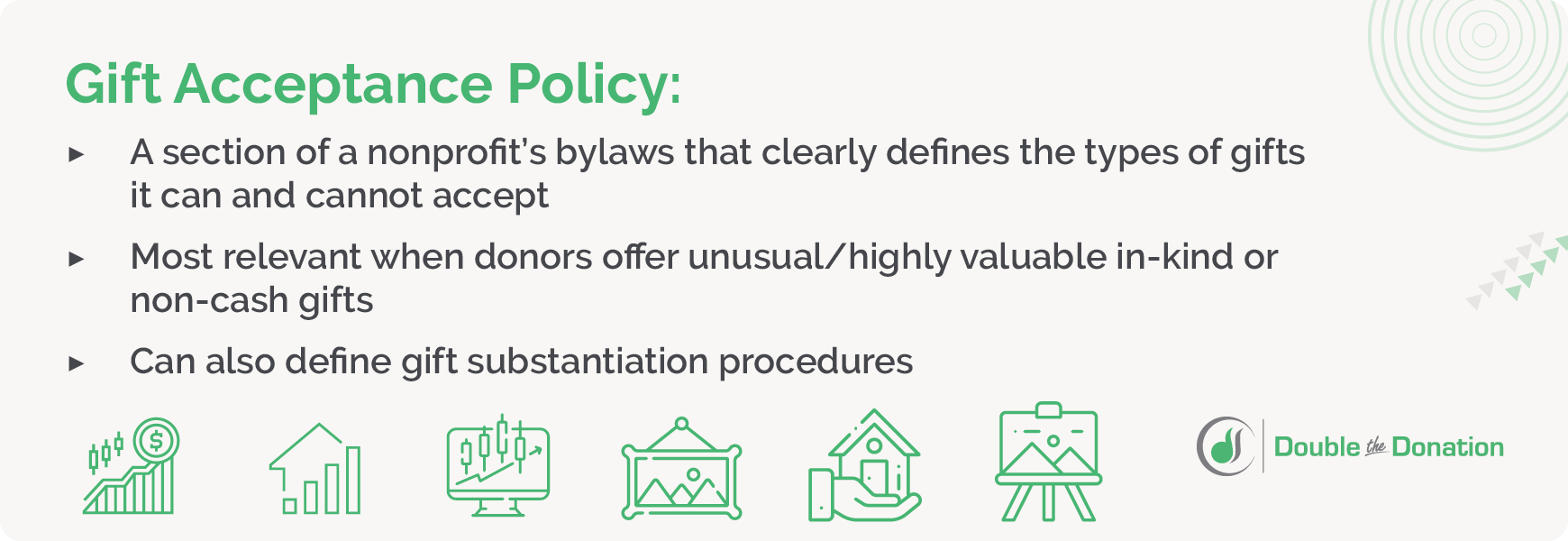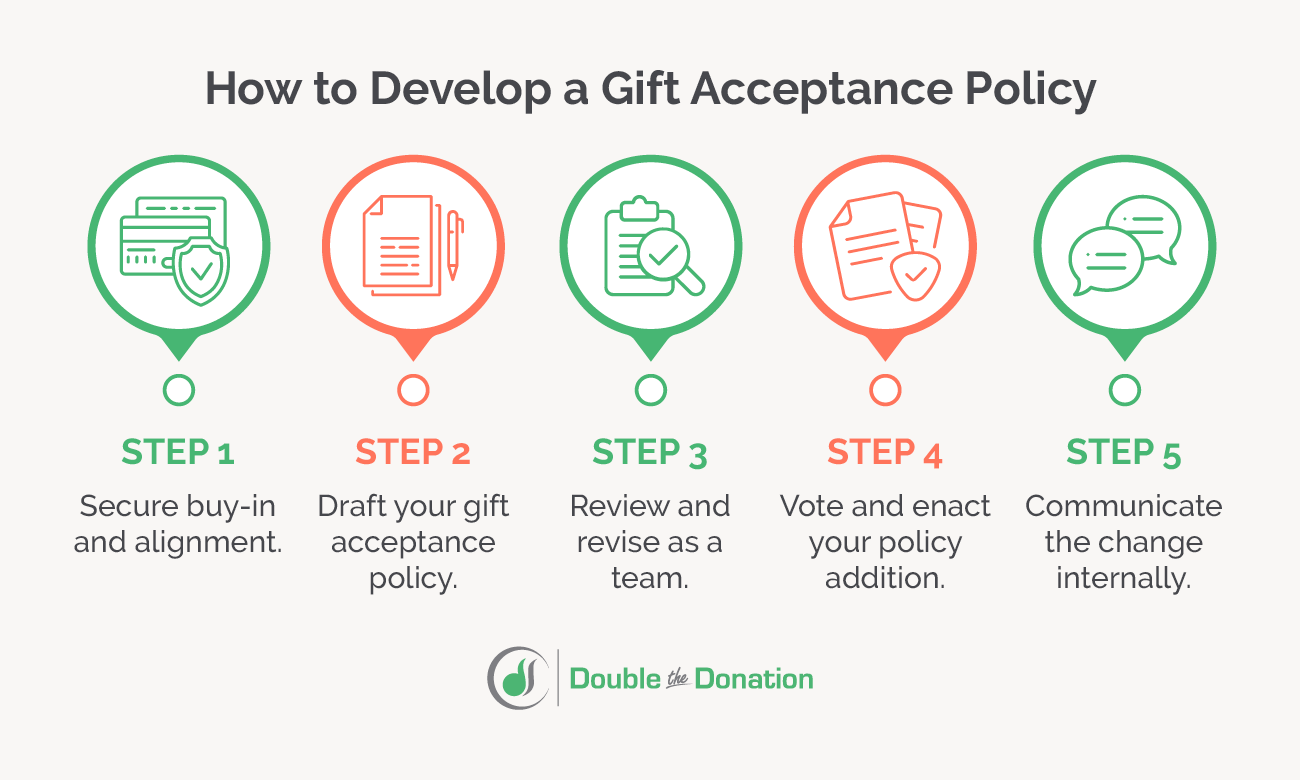Gift Acceptance Policies: Templates and FAQs for Nonprofits
Gift acceptance policies are an essential but easily overlooked part of nonprofit management. You won’t miss them until you need them, and then you’ll wish you’d created them earlier!
To avoid touchy (and potentially damaging) donor relations and legal situations, it’s worth taking the time to study up on these policies and how to create them. This quick guide covers all the essentials, plus extra considerations you need to know:
- Understanding Gift Acceptance Policies
- How to Create a Gift Acceptance Policy
- See Them in Action: Example Policies
- Gift Acceptance Policy Templates
- Additional Considerations to Keep in Mind
Looking for more ways to improve your nonprofit’s governing structures and set your organization up for success? We recommend board self-assessments.
 Understanding Nonprofit Gift Acceptance Policies
Understanding Nonprofit Gift Acceptance Policies
Let’s start with the fundamentals by reviewing a few frequently asked questions about nonprofit gift policies.
What is a gift acceptance policy?
A gift acceptance policy is a section of or addendum to a nonprofit’s bylaws that clearly defines the types of gifts it can and cannot accept. These policies most often come into play when donors offer to give unusual or exceedingly valuable in-kind or non-cash gifts.
In addition to defining acceptable types of gifts, thorough (and effective) acceptance policies also cover:
- The circumstances under which certain types of gifts can be accepted
- How certain types of in-kind and non-cash gifts will be liquidated and/or managed
- Who at the nonprofit is responsible for reviewing donations that may conflict with the acceptance policy
- Logistical details defining how certain gifts will recognized, tracked, and reported
- Guidelines for your general gift substantiation process, which is how and when donors receive acknowledgment for tax-deductible gifts valued over $250
Why do nonprofits create gift acceptance policies?
A gift acceptance policy spells out what you can and cannot accept, giving your fundraisers and donors a concrete set of guidelines to reference when tricky conversations arise.
Why is this important? All kinds of tangible items, assets, and securities get donated to nonprofits, and many may come with added baggage, such as compliance requirements, reputational implications, complex restrictions, and additional costs. This means there are cases when it’s in your nonprofit’s best interest to turn down a gift, either because its value isn’t worth the added work/cost of accepting it or because it might open you up to new liabilities that aren’t worth the risk.
Acceptance policies can also establish operating guidelines for gift substantiation and reporting, which are essential for maintaining your nonprofit’s legal compliance.
Plus, you may be required to have a gift acceptance policy in place when reporting some gifts to the IRS in your nonprofit’s annual 990 filing process. When reporting non-cash gifts, your nonprofit may be required to complete Schedule M (Noncash Contributions) of Form 990 if it has received over $25,000 in non-cash gifts or received certain gifts of art or similar assets. Schedule M asks whether you have a gift acceptance policy in place, and “no” is not an acceptable answer to this question.
What are the benefits of having concrete gift policies?
Gift acceptance policies provide a few key benefits:
- Policies give you concrete criteria for determining if you should or shouldn’t accept a gift with no guesswork needed.
- Policies make it much easier for fundraisers to turn down a gift with a simple “Our acceptance policy prohibits this kind of gift,” rather than a protracted or confusing conversation that could damage your relationship with the donor.
- Guidelines for gift reporting and substantiation included in your acceptance policy help to ensure that your organization fully complies with regulations by documenting them and assigning ownership in a central location.
- As mentioned above, gift acceptance policies are required as part of the Form 990 process, essential for maintaining your organization’s tax-exempt status.
How to Create a Gift Acceptance Policy: 5 Steps
You’re ready to update (or write your first) gift acceptance policy for your organization. Great! Now, what next? We recommend these core steps:
- Secure buy-in and alignment. Get your organization’s leadership and board on the same page about the need for a new or updated gift acceptance policy. You need official sign-off and ratification for the policy addition to take effect, so get a head start by putting it on everyone’s radar. Recruit one or two individuals to join a small committee. If you have a board member with professional legal experience or connections, ask them specifically to join.
- Draft your gift acceptance policy. Work with your team to draft a policy for your organization. Take a look at the example policies and templates below to get started. But be sure to take your time and seek legal input if needed. Although nonprofits’ gift acceptance policies are often quite similar, they should not be one-size-fits-all. A policy customized to your nonprofit’s needs, past experiences, and anticipated challenges (even if they’re unlikely) always offers the best protection.
- Review and revise as a team. Gather feedback from your team and one or two other organizational leaders or legal counsel who haven’t been involved in the drafting process. They’ll evaluate the policy more objectively and identify any potential problems or gaps that should be addressed in the next draft.
- Vote and enact your policy addition. Once you have a final version, share it with leaders and the board ahead of your next board meeting, and add the policy to the meeting agenda. During the meeting, discuss it as a group, determine if any further changes are needed, and then follow your organization’s protocol to vote on and enact the policy addition.
- Communicate the change internally. Add the new policy to your nonprofit’s official bylaws, republish them, and notify your entire internal team. Send a quick email that links to the updated policy and explains these key points:
- What an acceptance policy is
- Why you’ve created or updated one
- How it will help your nonprofit and specific teams
- Who to contact with questions
See Them in Action: Example Gift Acceptance Policies
Check out these real examples of nonprofit gift acceptance policies:
If you’re drafting or updating your own policy, we recommend carefully reading thorough examples like these to see their full range of details and specifications. Here are some notable sections and inclusions from these examples:
- Introductions and contextual sections that clearly define what your nonprofit considers a “gift”
- Details about any gift review committees or internal staff positions in charge of reviewing specific types of gifts and what that process entails
- Details, requirements, and expectations for any gift agreement processes that you may implement to ensure mutual understanding of the policies for large gifts above a certain value threshold
- Exact acceptance criteria and processes for gifts of cash, publicly traded securities, private securities, cryptocurrency, various types of in-kind gifts, real estate, donor-advised fund grants, various types of planned gifts, and more
- Liquidation timeframes for gifts of securities or cryptocurrency
- Whether certain types of gifts will be restricted or unrestricted upon donation, plus the process for changing a donation’s restriction status if desired by the donor
- Explanations of how employer-sponsored matching gifts will be recorded and substantiated
- Details about standard gift counting and reporting processes
Gift Acceptance Policy Templates
Gift acceptance policies are extremely varied as the whole point is that they should protect and support your unique organization. However, they do usually share a few common elements and details that make your staff’s lives easier and protect your 501(c)(3) status.
Policies can be simple and short to cover your bases or extremely thorough to spell out exact protocols for specific situations. For reference, here are templates for a basic and more detailed gift acceptance policy:
Gift Acceptance Policy Template – Basic
- [Nonprofit] solicits and accepts gifts consistent with its mission and support its core programs and special projects.
- Donations and other donated forms of support are generally accepted from individuals, corporations, foundations, government agencies, and other partners, subject to the following acceptance limitations:
- [Descriptions of limitations, which may include:]
- [Specific types of gifts]
- [Delivery/pickup of donated items]
- [Condition of donated items]
- [Proof of ownership or provenance of donated items]
- Gifts of Real Property, Personal Property, Securities, and other Assets may only be accepted upon approval of [specific committee within the nonprofit].
This example clearly states that accepted gifts are determined to be consistent with the mission, adhere to specific limitations, and require approval in some cases. Its last point helps cover your bases and eliminates the need for granular detail, but do not neglect to follow through with the approval process.
If a policy is so loose or light that it’s forgotten the next time a donor wants to gift you a certain type of donation, you might as well not have the policy in place at all!
Gift Acceptance Policy Template – Moderately Thorough
[Nonprofit] solicits and accepts gifts for purposes that will help it further and fulfill its mission. [Nonprofit] encourages prospective donors to seek the assistance of personal legal and financial advisors in matters relating to their gifts, including the resulting tax and estate planning consequences. The following policies govern acceptance of gifts made to [Nonprofit].
Purpose of the Policy: The purpose of this policy is to govern the acceptance by [Nonprofit] of [all or specific types of gifts], and to provide guidance to prospective donors.
Gift Review Committee: Any gift or proposed gift that does not comply with this policy must be reviewed and approved by the [internal committee], which is composed of [internal roles that make up the committee]. As indicated below, certain proposed gifts may require the approval of the [Board or Executive leadership, if applicable].
Use of Legal Counsel: [Nonprofit] will seek the advice of legal counsel in matters relating to acceptance of gifts when appropriate. Review by counsel is recommended for [common stipulations below]:
- Gifts of securities that are subject to restrictions or buy-sell agreements
- Documents naming [Nonprofit] as trustee or requiring it to act in any fiduciary capacity
- Gifts requiring [Nonprofit] to assume financial or other obligations
- Transactions with potential conflicts of interest
- Gifts of property that may be subject to environmental or other regulatory restrictions
Restrictions on Gifts: [Nonprofit] will not accept gifts that:
- Would result in [Nonprofit] violating its corporate charter
- Would result in [Nonprofit] losing its status as an IRC § 501(c)(3) not-for-profit organization
- Are too difficult or too expensive to administer in relation to their value
- Would result in any unacceptable consequences for the organization
- Are for purposes outside [Nonprofit]’s mission.
Decisions on the restrictive nature of a gift, and its acceptance or refusal, shall be made by the Executive Committee, in consultation with the Executive Director.
Gifts Generally Accepted Without Review [common examples below]:
- Cash. Cash gifts are acceptable in any form, including by check, money order, credit card, or online… [Provide additional requirements and restrictions for all gift types as needed.]
- Marketable Securities. [Include details about the transfer process, liquidation timeframe, restrictions, approval processes, etc.]
- Bequests and Beneficiary Designations under Revocable Trusts, Life Insurance Policies, Commercial Annuities, and Retirement Plans.
Gifts Accepted Subject to Prior Review:
Certain forms of gifts or donated properties will be subject to review by [committee, board, and/or executive leadership] prior to acceptance. Examples of gifts subject to prior review include, but are not limited to [common examples below]:
- Tangible Personal Property. [Details about acceptance requirements, restrictions, approval processes and criteria, etc.]
- Life Insurance.
- Real Estate.
This example is more thorough than the first and more clearly defines specific details about types of gifts and the processes and protocols that surround their acceptance.
But if you want, your policy can go even further! Consult with your nonprofit’s legal counsel to develop a gift acceptance policy tailored to your organization’s exact needs.
However, remember that while you don’t necessarily need to get your gift acceptance policy perfect the very first time, you do need to have one in place! You can always expand or refine it over time by working with your organization’s leaders and legal counsel.
 Additional Considerations to Keep in Mind
Additional Considerations to Keep in Mind
As you draft or update your nonprofit’s acceptance policy, there are additional considerations that you should keep in mind. These will help to further protect your organization, maximize the policy’s utility and value, and ensure adoption.
- Adjust your policy over time. As noted above, your gift acceptance policy is not set in stone. Drafting an exhaustive policy isn’t always necessary, and it can be quite time-intensive when done on your own. If you need to develop a basic one to cover your bases quickly, go for it. Then, take the time later to consult with a nonprofit legal expert, draft a more thorough version, and get it approved by your board.
- Include gift-specific clauses as needed. It might be easy to define what your nonprofit considers “gifts” and slap a gift review committee process onto the policy (definitely better than nothing!), but it might not serve you well in the long run. It’s easy to forget or neglect loose policies, and policies that create additional steps for multiple team members are likely to be disliked and perhaps disregarded over time—not a good outcome. Consider the types of gifts you currently accept and want to accept. For example, if your nonprofit wants to intentionally expand its programs for securing planned gifts or corporate gifts of in-kind goods, a policy playbook will be extremely helpful for reaching these goals.
- Consider additional types of clauses as needed. Most notably, decide if you want to include variance and morality clauses. The primary function of these clauses is to give your nonprofit options for dealing with the repercussions of a donor’s poor reputation or legal troubles, allowing your organization to separate itself from their name. An unfortunate outcome, but it does happen, so best to have options!
- Variance clauses in gift agreements dictate what happens when the original terms of a gift can no longer be met. For example, if a building funded by a donor’s major gift is renovated or rebuilt, their name will be removed from the updated or new building. These clauses can also more generally ban perpetual public recognition and eliminate any expectations that your nonprofit must display the donor’s name on prominent funded buildings or installations in perpetuity.
- Morality clauses explicitly give your nonprofit the ability to distance itself and remove naming if a donor (or the donor’s business practices) no longer align with your stated values and mission. These can be touchy to discuss with donors, which is why many nonprofits rely on a combination of variance and morality clauses to provide protection without offending new donors when gift terms are discussed.
- Have a plan for using your gift acceptance policy. When your gift acceptance policy is triggered (or a gift officer simply encounters an unfamiliar situation), have a process and guidelines in place for how to discuss it with donors. First, ensure your policy is internally publicized and easily accessible to everyone in your bylaws. Next, actively train your fundraisers, gift officers, accounting team, and any other relevant staff on the policy’s contents and applicability. Outline specific steps they should follow to elevate unusual or new issues that aren’t covered in your policy.
Deepening Relationships Through Non-Cash and Corporate Gifts
One final recommendation is to use the occasion of drafting or updating your nonprofit’s gift acceptance policy as an opportunity to consider your current (and ideal) revenue streams.
These policies are most helpful in situations that involve either non-cash gifts or donations made through other organizations rather than individuals. As you work on your acceptance policy, use it as a springboard to think about what further growth might look like for your nonprofit. Consider these questions:
- Are you heavily reliant on individual contributions?
- Are you making the most of opportunities to secure non-cash gifts or gifts from businesses and foundations?
- Do you actively talk about diverse or alternate giving options with donors?
- Have you promoted matching gifts to your donors (the easiest way to build a corporate giving stream by far)?
- Do you explore your major and mid-level donors’ corporate connections to uncover new potential partnerships?
Corporate giving platforms for nonprofits like Double the Donation and software built specifically for planned giving, stock giving, DAFs, and more can help you build more robust giving programs that match the robustness of your acceptance policies (and aspirations).
Explore your options and don’t be afraid to diversify. Overreliance on a single form of revenue is risky for nonprofits, and there are tons of easy ways to diversify your fundraising and give your donors better, more flexible experiences. To continue learning how to build a well governed and funded nonprofit, take a look at these additional resources:
- Nonprofit Board Orientation: How to Get New Members On Track
- 8 Trends in Corporate Philanthropy Today: How to Tap In
- Explainer: Nonprofit Investment Policy
- Explainer: Nonprofit Endowment





